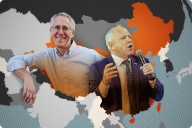You have /5 articles left.
Sign up for a free account or log in.
Academics have said that Taiwan’s overseas Mandarin-language centers, which are being rolled out after the shuttering of many Chinese-led Confucius Institutes, are in a strong position to thrive -- provided they steer clear of politics.
 According to Taiwan’s government, its growing network in the West “will offer overseas learners a free and democratic alternative to learning Mandarin,” with an emphasis on “Taiwanese characteristics.”
According to Taiwan’s government, its growing network in the West “will offer overseas learners a free and democratic alternative to learning Mandarin,” with an emphasis on “Taiwanese characteristics.”
So far, the program includes 15 outposts in the U.S., with three European locations, in London, Paris and Hamburg, Germany, and more centers hoped for “in the near future” -- something Taipei says will meet an “unmet demand” for Mandarin courses abroad. The program can also tap in to its connections with more than 1,000 schools and colleges internationally.
Steve Tsang, director of the China Institute at SOAS University of London, said that Taiwan’s traditional Chinese culture -- inherited from the mainland before it came under Communist rule -- and the strength of National Taiwan Normal University in Taipei put it in good stead for such an endeavor.
“If the new Taiwanese initiative will focus on delivering Mandarin teaching following the best practices in Taiwan, there is no reason to think it will not succeed,” he said.
He added that the island took a “more imaginative and student-focused approach” to teaching Mandarin than mainland China.
Philip Altbach, founding director of the Center for International Higher Education at Boston College, agreed, noting Taiwan’s long history of providing Chinese-language instruction.
“Based on the experience of universities and governments in Taiwan over decades, they’re in a good position to build something that makes sense,” he said.
But Altbach also cautioned that the program must avoid lacing its language teaching with anything that might be interpreted as propaganda, or it risks sharing the fate of China’s Confucius Institutes. In the U.S., dozens of the institutes have shut down in recent years due to political pressure and concerns over their aims.
Critics of the Confucius Institutes, which offer language and cultural programs abroad, have painted them as a vehicle for Beijing to spread propaganda under the guise of teaching, something the Chinese government has denied.
“As long as the Taiwanese don’t make it political -- which they absolutely will not -- they’ll be successful,” said Altbach.
Still, he said that Taiwan’s “soft power move” would probably see countermaneuvers from mainland China. “There will be efforts by the Chinese government to squash them at every turn.”
Yang Rui, a professor in the Faculty of Education at the University of Hong Kong, offered a more negative appraisal of the language program’s potential, saying that Taiwanese universities were “fast lagging behind” those in neighboring sectors, particularly mainland China.
But he, too, acknowledged that the move was about far more than Mandarin: “On all sides there have obviously been more political considerations than education.”
Even if the program falls short of creating fluent Chinese speakers, it is likely to achieve its aim of boosting Taiwan’s profile internationally and legitimizing its existence.
“It’s getting the rest of the world to understand there’s this little island out there, which is an autonomous place that … deserves respect in the world,” said Altbach.








